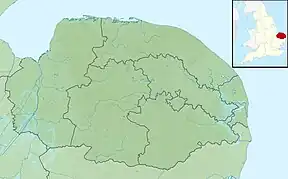| Wild Ken Hill | |
|---|---|
 Aerial view of part of Wild Ken Hill, 2011 | |
 Shown within Norfolk | |
| Town/City | Heacham Bottom, Heacham |
| Province | Norfolk |
| Country | United Kingdom |
| OS grid | TF6795435823 |
| Coordinates | 52°53′36″N 0°29′49″E / 52.89326°N 0.496961°E |
| Established | 2019 (as Wild Ken Hill) |
| Owner | Buscall family |
| Area | 4,000 acres (1,600 ha) |
| Produces | wheat[1] |
| Website | wildkenhill |
Wild Ken Hill is a rewilding and regenerative agriculture project located in Norfolk, England, at the edge of The Wash.[2][3]
History
.jpg.webp)
The name Ken Hill probably derives from a chieftain or landowner with the Anglo-Saxon name Cena.[4] The site has been inhabited from ancient times, with hoards including gold torcs, ingot rings, coins, bracelets and scrap metal from the last two centuries BC being found by archaeologists at Ken Hill.[5][6][7]
The farm has been owned by the Buscall family since the 1870s.[8]
The farm
The problem in the UK is not that we do not grow enough food. We don’t grow the right food, we waste vast amounts of food (£13bn per year), and we do not distribute it fairly – household food insecurity has actually risen among the most vulnerable in society. Part of the answer is to grow a healthier, more diverse mix of food – currently 85pc of UK farmland is used to supply the meat processing industry. We need to use some of this land for vegetables, nuts, fruit, pulses, which can be grown, supplied and consumed locally, and typically require much less area. We also need to use more land to protect air quality, water quality, the environment, and nature with schemes like rewilding.
Dominic Buscall, Project Manager[9]
Wild Ken Hill is a lowland farm with some grassland, meadow, heathland and shrub. In the middle of the farm, arable farming and intensive grazing have been replaced with low density herbivores (Red Poll cattle, Tamworth pigs, Exmoor ponies). Woodland thinning encourages wood pasture. European beavers have been reintroduced within an enclosure.[10]
The farm also manages freshwater marsh, river valleys and woodland in a traditional manner in the west of the farm.[11] The eastern part of the farm is used for regenerative agriculture, where "we aim to repair soil health to sequester carbon and boost biodiversity, whilst also delivering good, sustainable yields with minimal use of chemical inputs."[12]
Media appearances
Wild Ken Hill was used for the filming of the BBC series Springwatch, Autumnwatch and Winterwatch in 2021–22.[13][14][15][16]
References
- ↑ Hill, Chris (October 11, 2021). "Pioneering farm is growing eco-friendly wheat in pastures". Eastern Daily Press.
- ↑ "Poll finds more than four-fifths of people back rewilding in Britain". www.scotsman.com.
- ↑ "Support grows for rewilding plans across the UK". County Times.
- ↑ Moss, John (May 30, 2020). A History of English Place Names and Where They Came From. Pen and Sword History. ISBN 9781526722874 – via Google Books.
- ↑ Robertson, David; Wade-Martins, Peter; Wade-Martins, Susanna (January 6, 2022). A History of Norfolk in 100 Places. History Press. ISBN 9780750998246 – via Google Books.
- ↑ Foulds, Elizabeth Marie (January 26, 2017). Dress and Identity in Iron Age Britain: A study of glass beads and other objects of personal adornment. Archaeopress Publishing Ltd. ISBN 9781784915278 – via Google Books.
- ↑ "torc | British Museum". The British Museum.
- ↑ "Country Life". Country Life, Limited. January 29, 1996 – via Google Books.
- ↑ Bishop, Chris (April 29, 2020). "Norfolk farm fights climate change and impact of Brexit by rewilding". Eastern Daily Press.
- ↑ "Wild Ken Hill". Rewilding Britain.
- ↑ "Our Approach". Wild Ken Hill.
- ↑ "Wild Ken Hill - Land Use Model" (PDF). 2020-05-16. Retrieved 2023-10-15.
- ↑ "Washed up: Tree-hugger Sheeran has not got a rewilding wand". 11 January 2022.
- ↑ Bishop, Chris (January 19, 2022). "Surprises in store as Winterwatch returns to Norfolk". Eastern Daily Press.
- ↑ "BBC Autumnwatch: Norfolk return for Chris Packham and Michaela Strachan". BBC News. October 26, 2021.
- ↑ "BBC Springwatch at Wild Ken Hill 'amazing for rewilding'". BBC News. June 14, 2021.